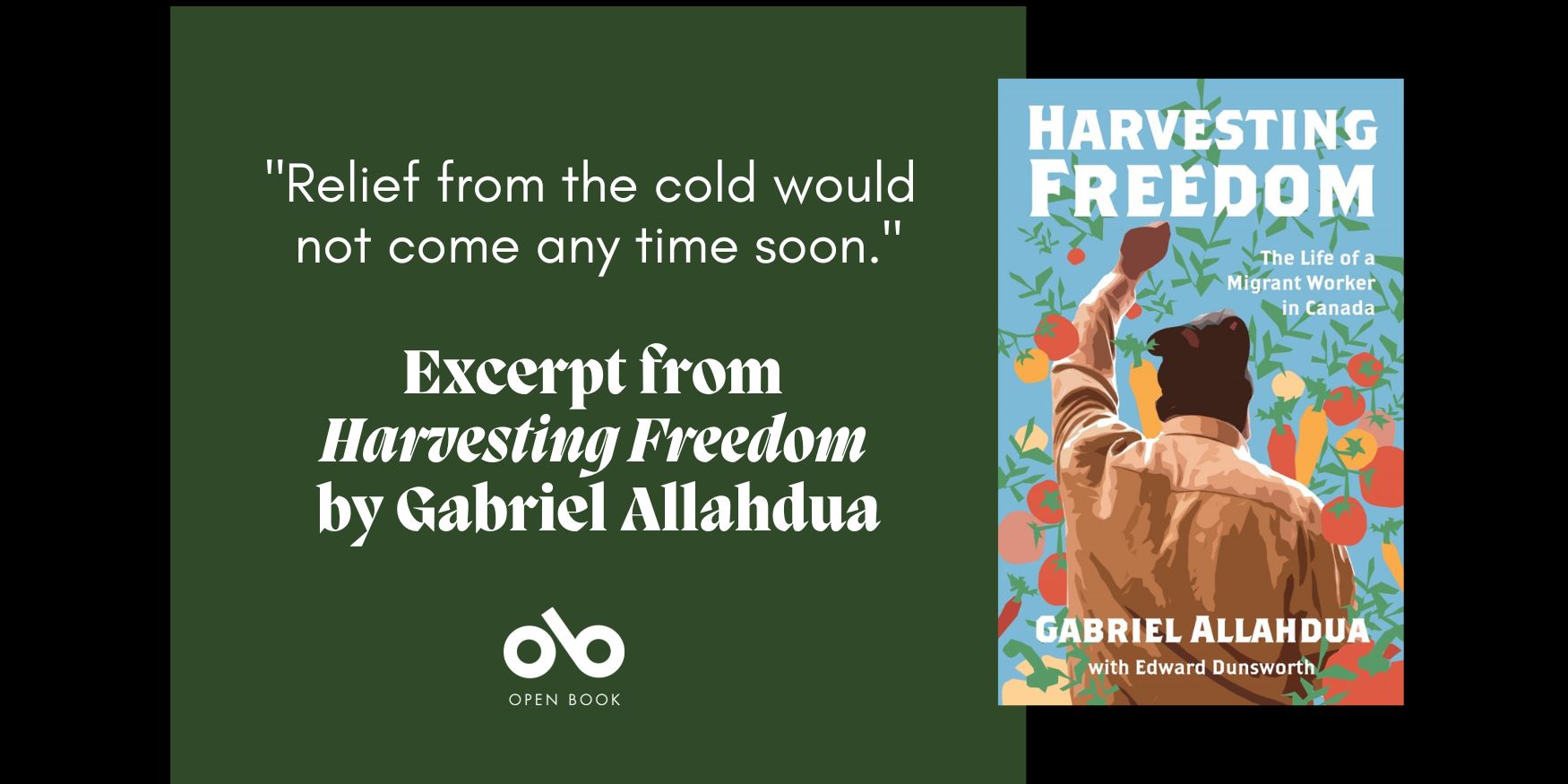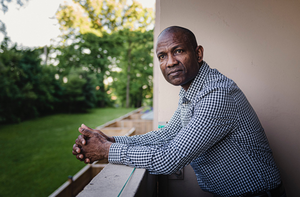Excerpt from Harvesting Freedom, a Firsthand Account of What It's Really Like to Be a Migrant Worker in Canada
Growing up in the rural Mabouya Valley in St. Lucia, Gabriel Allahdua, "never heard anything bad or sad about Canada". When he made the difficult decision as an adult to participate in the Canada-St. Lucia partnership program SAWP (Seasonal Agricultural Workers Program), leaving two adolescent children at home, he did so with a heavy heart but confidence that his new country of work would provide him with opportunity and support. When he arrived, he found something entirely different.
Allahdua's account of his time in Canada is brought to life in Harvesting Freedom: The Life of a Migrant Worker in Canada (Between the Lines, written with Edward Dunsworth), an unflinching memoir that exposes the reality of life in Canada for visiting workers – the people without whom Canada's food production would grind to a halt.
Since his time with SAWP and the disillusionment he experienced, Allahdua has become a leading activist in the migrant justice movement in Canada, calling for drastic reform of an industry that promises much while delivering inequality, disrespect, and even abuse.
We're presenting an excerpt here today from Harvesting Freedom, courtesy of Between the Lines Books, in which we see Allahdua's very first night in Canada and witness his creeping sense that all is not going to be as he'd been told – the nascent awakening of an activist spirit and a quest for justice for the thousands of people in similar positions.
Excerpt from Harvesting Freedom: The Life of a Migrant Worker in Canada by Gabriel Allahdua:
Welcome to Canada
I left my home in St. Lucia for Canada under the cover of darkness and arrived on the farm in Canada, which was to be my home and workplace for the next eight months, under the cover of darkness twenty-four hours later.
Early in the morning of the previous day, January 17, 2012, I jumped out of my bed, full of nervous energy, to embark on a long but significant journey in my life, a journey that would test and ultimately transform various aspects of my physical, spiritual, financial, and social life. The first flight was to sunny Barbados, where my companions and I, sixteen of us migrant farm workers from St. Lucia, spent a long day in the airport, anxiously waiting for our evening flight to Toronto, making the best of it by watching cricket on television at the airport bar and slowly getting to know one another.
It was only during the long layover in the Barbados airport that my early-morning excitement began to give way to some more conflicted feelings about the journey I was on. In other words, reality began to set in. That day was a mental war zone for me, with half of my brain telling me to go to Canada and the other half telling me to stay. Holding me back were the uncertainties of travelling to a new country to work in a program that I knew little about, and leaving behind everything I had and everyone I knew—most importantly, my two children, Gania, thirteen, and Christi, eleven, during the critical adolescent stage.
On the other hand, I was pushed forward by my burning desire to experience commercial agriculture, my dire financial situation, and the hope that working in Canada might provide a solution to my predicament.
Finally, it was time to leave Barbados and board the flight to Toronto. The battle to calm my mind continued during that five-hour flight. Conversations with the two newfound friends and colleagues I was seated between couldn’t calm my thoughts and fears in anticipation of the unknown. Nor could the in-flight entertainment.
At last, we landed at Pearson airport in Toronto, went through immigration, and were met by a member of the diplomatic corps of the Organization of Eastern Caribbean States—of which St. Lucia is a member—who was to serve as our liaison officer during our stay in Canada. Dressed in a stylish, long, and expensive-looking winter coat, the liaison officer addressed us in the diplomatic language common to such officials, offering us words that he intended to be comforting, welcoming, and reassuring.
Your CanLit News
Subscribe to Open Book’s newsletter to get local book events, literary content, writing tips, and more in your inbox
But if any of us were reassured, it wore off quickly. The moment we stepped out of the airport and into the cold, mid-January night, we realized that we did not have the appropriate clothing to face the winter. In the long process of applying to and joining the program, no government official had prepared us for this crucial fact, let alone supplied us with any winter clothing. In that moment, the bitterly cold wind felt like a hard slap in the face.
Relief from the cold would not come any time soon. The bus that had been sent to take us to our assigned farm in Leamington, Ontario, did not have functioning heating. For a full four hours, as the clock ticked past midnight and into the early morning hours, we sat on the freezing, dark bus as it lumbered west down the 401, shivering and wondering what we had gotten ourselves into.
Things did not improve upon arrival at the farm. When we finally got there at around three o’clock in the morning, the driver dropped us off at the wrong bunkhouse. It was empty, the beds were all turned upside down, and worst of all—after four hours in a freezing bus—the heat was not on.
The farm office was closed and no one was inside. The bus driver had already left. We were in a new place in a new country, in the middle of the night in the dead of winter. We had no choice but to wait in the frigid bunkhouse until seven in the morning, when the sun peeked above the horizon and workers on the farm began to stir. Only then were we finally directed to our correct bunkhouse, which, to our great relief, had functioning heating.
For me and my fifteen companions, this was our welcome to Canada. If our welcome was that rough, I wondered, was I really ready to face what was in store for me?
--
My welcome to Canada contrasted sharply with the ideas of the country I had held up to that point—especially growing up. Throughout my schooling in St. Lucia, Canada was presented as a place of high standards. We admired Canada for its economy, education, health care, diversity, human rights record, and agriculture. We were impressed by its expansive and beautiful geography.
Coming from a small, developing island country, seemingly nowhere on the map and known principally for its bananas and beaches, Canada stood out not only as an example to look up to, but as almost a paradise: a site of refuge, a champion of human rights, the ideal place to raise a family. Growing up, I never heard anything bad or sad about Canada. And as the saying goes, no news is good news.
Canada also played an active role in development projects in St. Lucia, something that directly benefited me as an adolescent. The last secondary school that I attended, the Castries Comprehensive Secondary School (CCSS), was, in fact, a gift from Canada, built by the Canadian International Development Agency (CIDA) and opened in 1976. It was a “comprehensive” secondary school, a higher academic level than a normal high school, and very well equipped.
By gifting my secondary school, Canada helped me at that stage in my life to have a decent standard of living, opening the door to employment and educational opportunities in St. Lucia that otherwise would not have been available to me.
The Seasonal Agricultural Worker Program (SAWP)—the migrant farm worker program in which I would later take part—also had a very positive reputation in St. Lucia. It was yet another example of Canada’s generosity and the economic opportunities available there.
I first heard about the program as a child. At that time, in the late 1970s, in my family home in rural Mabouya Valley, we did not have electricity. Because this was typical of most families in the countryside, it was common practice for neighbours to come together in the evening at the home of someone who had electricity, and especially television or radio. People would either socialize or listen to programs that they were interested in. In this way, my mother would often take me and my siblings to a neighbour’s house, where we would play with the other children while the adults chatted, listened to the radio, and so on.
During these evenings at neighbours’ homes, I remember hearing over the radio about people signing up for the “farm program,” which meant both the Canadian program as well as a similar arrangement with the United States. The Labour Department would use the radio to call out the names of workers who had been selected, instructing them to come down to the ministry to complete their paperwork and the like. When these bulletins came on the radio, the grown-ups would often comment on how the program had benefited the families of participating workers. The way my elders spoke about it, being in the program sounded like an immense privilege.
Just like with Canada as a whole, I never heard anything bad about the program. And again, I figured that no news is good news. Over the course of that long, freezing first night in Canada, my perception of the country began to crack. In the coming months and years, it would shatter.
___________________________________________________
Excerpt from Harvesting Freedom: The Life of a Migrant Worker in Canada by Gabriel Allahdua. Published by Between the Lines Books. Copyright Gabriel Allahdua, 2023. Reprinted with permission.
Originally from St. Lucia, Gabriel Allahdua worked as a migrant farm worker in the Seasonal Agricultural Worker Program for four years, from 2012 to 2015, before leaving the program to seek permanent residency in Canada. Now a leading voice in the migrant justice movement, Allahdua is an organizer with Justicia for Migrant Workers and an outreach worker with The Neighbourhood Organization, providing services to migrant workers across southwestern Ontario. He lives in Toronto with his two adult children and his grandson.
Edward Dunsworth is a historian of migration and labour and assistant professor in the Department of History and Classical Studies at McGill University. He lives in Longueuil, Quebec, with his wife and two children.






